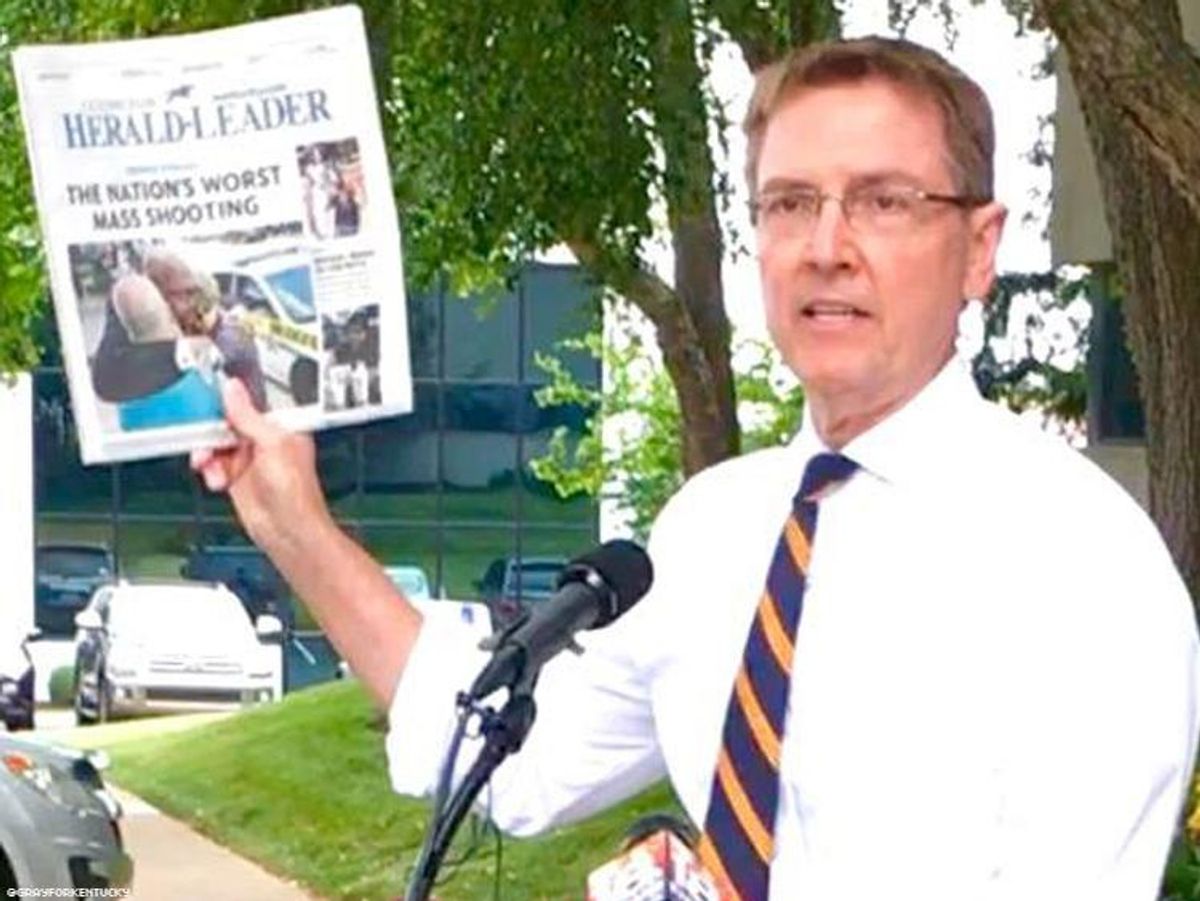Jim Gray was in a car on the way to Sunday church in Kentucky when he read the news on Twitter that a gay club had been targeted in a mass shooting. Later that night, he spoke before a vigil in Lexington, as the city's mayor and as a gay man.
"Today, June 12, 2016, will be etched sadly and forever in the history of our LGBT community; indeed, in our nation's history," he told attendees. "It will punctuate and mark a time when unexpected breakthroughs had occurred, more LGBT civil and human rights achieved, marriage equality had just been born, and then a setback like this immense tragedy."
Gray himself is part of the sweeping advances made for LGBT people. The two-term mayor won the Democratic primary for U.S. Senate in his state last month, and he's taking on incumbent Sen. Rand Paul. This is a state with no out elected officials (save for him), and one that's home to Kim Davis, who became the face of resistance to LGBT rights based on so-called religious freedom. If Gray were to win in November, he'd be the first out man to serve in the Senate.
Tammy Baldwin of Wisconsin is the Senate's first out woman. And she took to the floor on Wednesday to read the names of the 49 victims in Orlando and to call for stricter gun control measures.
Back in Kentucky, Gray was doing the same thing. He held two news conferences and spoke to The Advocate while driving from Lexington to Louisville for the second event, when he'd challenge Paul to back the "No Fly, No Buy" bill that is being pressed in Congress.
Gray calls it "the terror gun loophole legislation."
"Let me put it this way, it's not that complicated," he said. "If you're too dangerous to buy an airplane ticket, you're too dangerous to buy an assault weapon. And, when we talk about the Second Amendment -- I support the Second Amendment -- but the Second Amendment was created and designed to prevent tyranny and not to encourage terror. We are talking about terror here; we are not talking about compromising the rights of law-abiding citizens."
Gray is a gun owner himself. He has a .22-caliber, which is "a little bit of practice gun," and a 20-gauge shotgun. They were both his father's guns. Gray comes from "a family of responsible gun ownership and hunting," though he doesn't spend time shooting at gun ranges these days.
While Gray doesn't support banning assault rifles, like the one used in the Orlando shooting, he does favor universal background checks like the ones proposed in the Manchin-Toomey bill defeated in Congress back in 2013 after the Newtown, Conn., shooting.
"And I think most law-abiding citizens will recognize that we don't want guns in the hands of criminals and terrorists and those who are severely mentally disabled," he said. "I am the mayor of a city and I have seen the effect of criminals having guns, and that's why I support this legislation. I have strong conviction about this because of the role that I have."
The police chief in Lexington said earlier this year that the city was experiencing an uptick in gun violence, with four homicides in the first 13 days of the year alone. He viewed it as part of the national trend.
Now we have a mass shooting in Orlando that is the worst in the country's history. Gray says the attack was both "terrorism and hate." Kentucky, much more socially conservative outside its urban centers, is mourning along with the rest of the country for the LGBT people who were targeted, says Gray.
That might surprise LGBT people who associate Kentucky with Davis, the county clerk who received a hero's welcome when she was released from jail for refusing to marry same-sex couples.
"I got a dozen text messages or more from people who are reaching out, expressing sympathy for the Orlando shootings," Gray said. "People who I talk to in Kentucky are sympathetic."
It's not that discrimination doesn't exist in Kentucky.
"Oh, yes, I've had people come up to me," he said of the campaign trail. "Not often, it's just happened a couple of times so far."
These people were "aggressively advocating their point of view, which was not an inclusive point of view, I'll put it that way," Gray said.
Prejudice isn't something you easily forget. And in the moment, Gray tries to be respectful.
"[I] try to say, I'm sorry you feel this way, but I understand that you can have your point of view," he said. "When these feelings come from a deeply religious background, I am unlikely to change them. But I do know that I'm a role model and that I'm breaking new ground with this statewide election."
When Gray declared his candidacy, the reaction was mixed from the Washington media. On the one hand, you have a two-term mayor of a major city who started out with a very successful construction business and could potentially tap those resources to make a strong go of it. But Gray will still be an out gay man in Kentucky, a Democrat in the same state that repeatedly elects Mitch McConnell, the Republicans' conservative Senate majority leader.
LGBT voters are known for their deep pockets in supporting the candidates they admire, having sent thousands upon thousands to Hillary Clinton, and Barack Obama before her. And Gray would welcome that kind of support in taking on Paul.
"Well I would tell them I have resources but not sufficient resources to fund a U.S. Senate race," Gray said of courting LGBT dollars. "I'm investing in my own campaign, I'm investing in ideas, and I certainly hope that I can secure the support of members of the LGBT community, my community."













































































Here's our dream all-queer cast for 'The White Lotus' season 4